|
Posted Wednesday, August 18, 2004 at 11:30 a.m. CDT
A day of
discussion; Asian Catholics are optimistic people, despite trials and setbacks
Asian hope rests clearly on the belief that the Spirit is
alive within their Churches By THOMAS C. FOX
Daejeon, South Korea
It is day three
and the bishops, and invited participants, broke into discussion groups to offer
further reflections on the working paper on the family, “The pastoral situation
on the family in Asia,” which they received upon arrival and hope to publish in
some form at the end of the week long gathering.
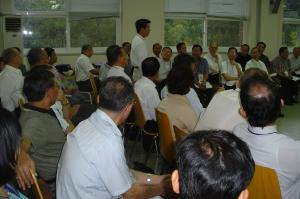 |
|
Today was a day devoted to
workshops at which conference participants, lay men and women, religious and
clergy all deliberated points in the working paper on the family.
|
Some of the early
discussion today centered on the process of this plenary assembly of Asian
bishops. The meeting has been intentionally structured differently from recent
plenary assemblies, according to Brother Edmund Chia of Malaysia, one of the
principal organizers, in order to give the bishops more time for discussions.
In January 2000,
when the Asian bishops met outside of Bangkok at a pastoral center, they
discussed 20 papers submitted by experts covering a range of social, economic,
pastoral and theological topics. From those papers and subsequent discussions, a
document drafting committee worked late into the nights piecing together papers
for further consideration. Looking back, some thought the process was hectic and
did not allow for enough reflection.
This time,
responding to bishops who wanted more input and time for evaluation, Archbishop
Orlando Quevedo, working with the FABC general secretariat, wrote a draft paper
on the family under the assembly theme: “The Asian Family toward a Culture of
Life.” That draft was sent out to each of the episcopal conferences for input
before Quevedo redrafted it early this summer.
Speaking today in
discussion groups, some bishops said they preferred the old process, which
produced a better paper trail. Others said they liked the new process, which in
some instances stimulated local input among lay couples and others.
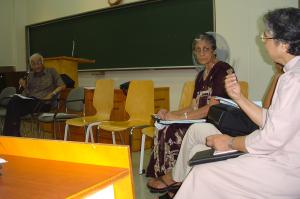 |
| Participants sharing and
listening. |
Today and
tomorrow assembly participants are meeting in groups by region – East Asia,
South East Asia and South Asia - and at times by subject matter, to further
assess the working paper.
While the bishops
are reflecting, allow me to offer a reflection as well. This one begins with
rain. Just about the time the Asian bishops began to arrive here last Monday the
skies began to rain. It has hardly let up for three days -- with the remarkable
exception of about one hour early this morning when Mass was celebrated on a
lawn outside the St. J. Hasang Education Center.
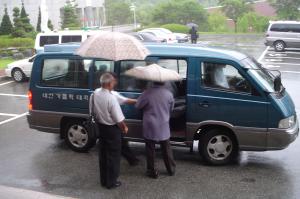 |
|
It’s been raining for three
days straight, forcing conference participants to dart from one building to
another, or in and out of shuttle buses, under umbrellas. |
There are two ways to
look at the rain. The first is that it is unfortunate for conference
participants who have to scurry from building to building under umbrellas. The
second – we might call it the Asian way – is to see the bright side, to
recognize that the rains have lowered the mid- August temperatures and humidity
that makes life close to unbearable for many during Asian summer months.
The lesson here is
that many Asians -- and notably the Asians who have gathered here for the eighth
plenary assembly of the Federation of Asian Bishops’ Conferences – are
optimistic people, despite trials and setbacks.
Without a
question Asian Catholics, like the wider Asian communities, are faced with
challenges that appear to be of biblical proportion. The first section of he
working paper, “The pastoral situation on the family in Asia,” lists at length a
host of serious crises including widespread poverty, landlessness, cultural
globalization, child labor, and ecological degradation among others.
At the same time,
one can ask virtually any bishop here about the future of his local church and
he has something optimistic to say. More precisely, he is likely to speak of
hope.
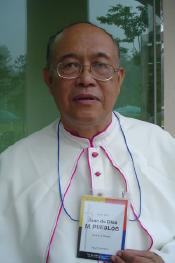 |
| Bishop Juan
de Dios Pueblos, Bishop of Butuan in the Philippines |
Consider the
words of Bishop Juan de Dios Pueblos, Bishop of Butuan in the Philippines. He
says without hesitation, “the level of globalization that exists as an empire is
passing.” Taking its place is a new kind of globalization, “globalization as
humanity and collegiality and a sense of one world.” At the level of local
church, he sees this same phenomenon. There are signs, he said, of new levels of
“loving and sharing each others goods.” Is he hopeful? Very much so. Our hope,
he says, is “anchored in the faith that we have in Jesus Christ.”
He adds that the
religions of Asia share a common belief in “a culture of life, communion and
service.” He sees that coming from the Spirit.
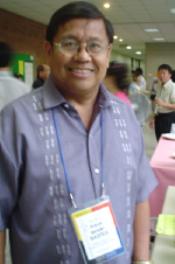 |
|
Bishop Arturo M. Bastes of
Romblon, Philippines speaks with optimism about the future. |
Bishop Arturo M.
Bastes of Romblon, Philippines speaks with similar optimism. Is he hopeful? Yes.
He is looking forward to a biblical congress he is helping to organized, set for
2005, the theme of which is “God’s Word, Living Hope and Lasting Peace.” “One
of our aims of the congress is to make the bible more authentically Asia,” he
says. The West, he adds, has dominated the church in Asia for too long and now
Asians are gaining their own “authentic identity.” Asians, he points out, read
the bible differently from most Westerners. The Western historical critical
method is not as important as finding the message of the Spirit in the texts.
Some outsiders might
not readily understand Asian optimism. It seems to come in part from being a
relatively young Church. There appear to be a number of factors playing into the
Asian Church mindset.
First, this Asian
hope rests clearly on the belief that the Spirit is alive within their Churches
and throughout the wider world – despite clear signs of human weakness and sin.
Second, these Asians feel connected with the Spirit and believe they are being
guided by the Spirit. Third, this Asian hope grows out of a confidence and an
increased ownership of a vision of Church they have developed and laid claim to
during the past thirty-five years.
It is a vision
they proudly call “a new way of being church.” This vision is characteristically
humble. Asians might be proud but they are not boisterous. Theirs is a vision
based on humble dialogue. It is a vision that does not claim all the answers. It
is a vision that believes they have more to learn, more to discover. Yet it is a
vision grounded in Asian reality. It is a vision of minority churches, a vision
of the triple dialogue: with the vast numbers of poor, with the rich religious
traditions of Asia and with their local cultures.
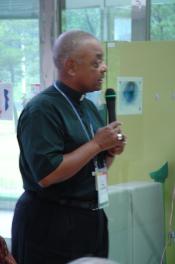 |
|
A U.S. bishops' delegation
headed by Bishop Wilton Gregory, president of the U.S. bishops’ conference,
dropped in on the Asian bishops’ gathering. He was warmly received after
speaking briefly during lunch. One Asian bishop, surprised to see an
African-American U.S.bishops’ conference president, exclaimed: “He’s one of
us!”
|
Next to hope,
fraternity characterizes the work of these bishops. Patriarchy is an Asian
tradition. Excessive patriarchy dies hard, even within the Asian churches. But
there is a new, though uneven, openness to women and a rich fraternity among the
bishops themselves. This fraternity is clear and abundant at this gathering.
Compared with Western episcopal gatherings – especially those aimed at producing
faith-based statements for the public record – Asian bishops’ gatherings are
relaxed and informal.
Plenty of time is
allowed each evening and sometimes during the day for socializing, often with
beer, wine and other spirits.
These are not tired
old men. They are men with energy and openness to the world and to the Spirit.
They are grounded in their local churches.
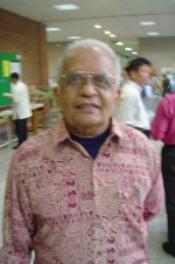 |
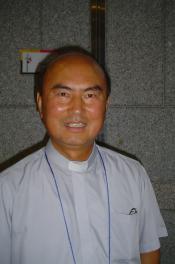 |
| Ask Antony Selvanayagam, Bishop
of Penang, Malaysia where he finds hope and he says flatly, “We are fully
into the building up of basic ecclesia communities. That is where I see
hope.” |
Being open to the Spirit is
essential to finding hope, says Bishop Boniface Choi Ki-san, Bishop of
Inchon, Korea. |
Ask Antony
Selvanayagam, Bishop of Penang, Malaysia where he finds hope and he says flatly,
“We are fully into the building up of basic ecclesia communities. That is where
I see hope.” He goes on: “Individuals and families in these communities believe
in one another. Living as a community their faith is strengthening.” He adds,
“People who have been touched by the Lord are interested in being in
communities.”
Being open to the
Spirit is essential to finding hope, says Bishop Boniface Choi Ki-san, Bishop of
Inchon, Korea. Asians are poor people and in this poverty is a kind of humility,
a dependency, he explains, adding, “Asian people need God,” unlike some
Europeans who “are already satisfied by themselves.”
So these Asian bishops
and other delegates will continue to ponder family life and its many challenges
in Asia in troubling times. They will produce a paper, adding to the rich FABC
documents that have been published in the past three decades. In the final
analysis, however, it will be their intimate connections with their peoples,
cultures and religious heritages that will be the final measure of their
success. By all appearances, that’s where they are encountering God.
[Fox is publisher of the National Catholic Reporter and author of Pentecost in Asia, a book about the Asian churches. His e-mail address is tfox@ncronline.org.]
|